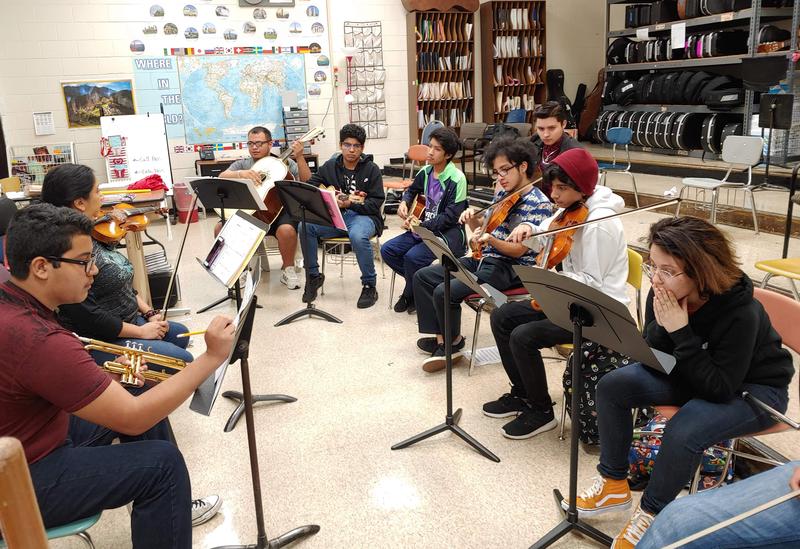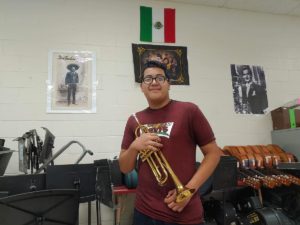
They sound like they could be pros. But they’re still in high school.
The group’s name is Mariachi Los Potrillos, and they are an example of how the growing Latino population across the country is shaping music education.
On a recent Thursday afternoon at Glencliff High School, the building looks completely empty. That’s until Ms. Gaby Fuentes opens the door to her classroom.
There are eight students inside the room with instruments in hand as part of Mariachi Los Potrillos — an after-school program.
Most of them, like Juan Jimenez, are sophomores in high school who had never played an instrument until they joined the group.
“When I first joined mariachi, I was more interested in a little bit guitar,” Jimenez says.
He quickly realized he wanted to play a different instrument. So he switched to the trumpet.
“Since I’m loud, I’m like ‘Yeah, that’s for me,'” Jimenez says. “I want to be the person in the back playing with all the passion in the world, and I just want to be the best out of all of them.”
 Sergio Martínez-Beltrán WPLN
Sergio Martínez-Beltrán WPLNMariachi Los Potrillos’ Juan Jimenez sees the group as an opportunity to learn Spanish, the native language of his parents.
This mariachi group has given Jimenez more than the skills to play an instrument.
Most of the students are children of immigrants, and they were born in the U.S. So, they hear their parents speaking Spanish at home, but not all of them know the language.
“Every single person in my family speaks Spanish, and I just feel a little — sometimes when I can’t speak, I feel a little — a little dumb,” Jimenez says.
But he is now learning the language, and he says he now feels more connected to his Latino roots.
Fuentes, the mariachi teacher at Glencliff and the person who oversees mariachi education at Metro Nashville Public Schools, says she understands how Jimenez feels.
“Growing up — first generation of migrant parents — my two older sisters communicated a lot more in Spanish with my parents,” Fuentes said. “I, right away, was in (English-language) school. So my basic, kindergarten Spanish, that’s all I had. Once I joined mariachi, that’s when I really started to learn that Spanish again.”
The descriptive lyrics of the songs help students learn the language, and Fuentes uses Spanish words to help drive certain themes home. Like, when she explains the power of sones — a category of Mexican folk music.
“Like we were stolen of everything else, sadly enough. But this is like, ‘That’s our country music right there.’ So, we kinda need to be — I guess macho, macha,” Fuentes told the students at a rehearsal. “We are tough cookies.”
 Sergio Martínez-Beltrán WPLN
Sergio Martínez-Beltrán WPLNOverall, Fuentes said she wants these kids — who hail from Mexico, Honduras and Puerto Rico — to feel at home.
Overall, Fuentes says she wants these kids — who hail from Mexico, Honduras and Puerto Rico— to feel at home.
And that’s something this program provides, says Marcia Neel, the president of Music Education Consultants, Inc.
Neel’s specialty is mariachi education. She says programs like the one at Glencliff High makes schools feel more approachable, especially for Latino families.
According to district data, there are about 7,000 more Latino students in Metro Nashville Public Schools this year than five years ago.
“All of that stuff is just reaffirming that, ‘It’s OK for me to be me,'” Neel says. “And it’s such a checkerboard for that person that they can be themselves and be accepted for who they are.”
I'm working on a story about this young mariachi group, and I can't stop watching this video I took during one of their rehearsals. ¡Que voz! pic.twitter.com/4pD298jMca
— Sergio Martínez-Beltrán (@SergioMarBel) September 30, 2019
Mariachi Los Potrillos is getting notoriety — the band is starting to score big gigs across the city — including the inauguration of Nashville Mayor John Cooper.
There’s an alumnus who’s aiming to do mariachi professionally. His name is Gustavo Becerra, and unlike most of the students in the group, his first language is Spanish.
“I feel like I have this opportunity to speak on behalf of the Hispanic culture and say, ‘We are here to be successful. To give it 110 percent every day,'” Becerra says in Spanish.
He joined the program when he first came to the U.S. seven years ago. He has already graduated high school, but he says this group is bigger than just a high school band or his ticket to stardom — it’s his family.
“I’m going to keep coming because I’m part of this,” Becerra says. “This is home.”

